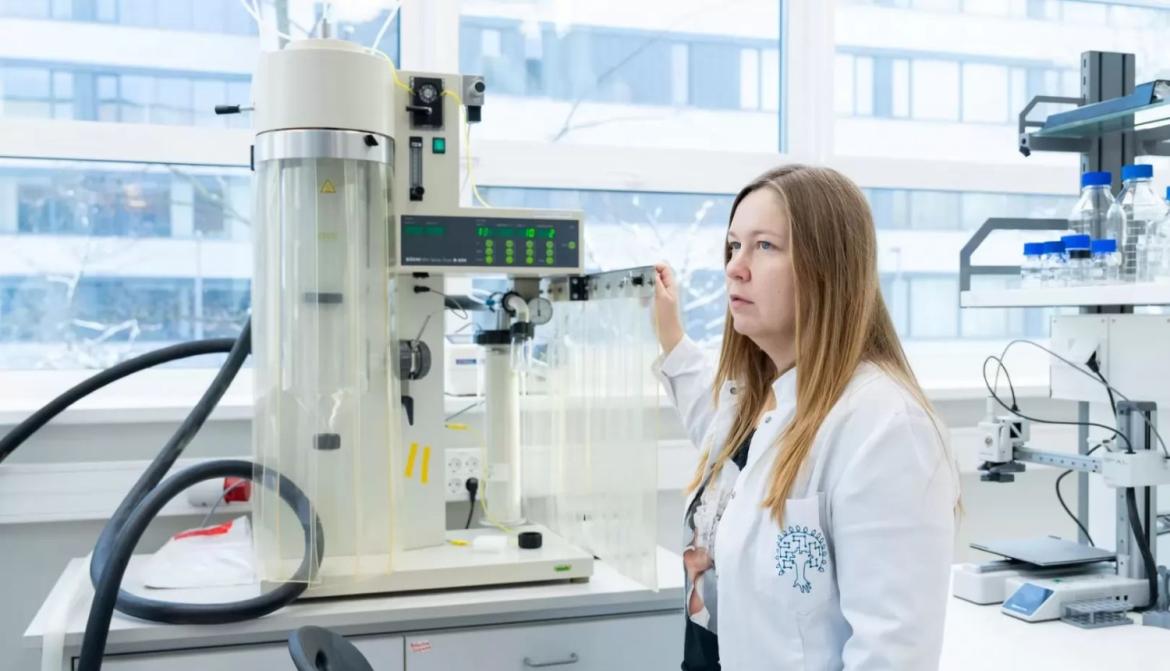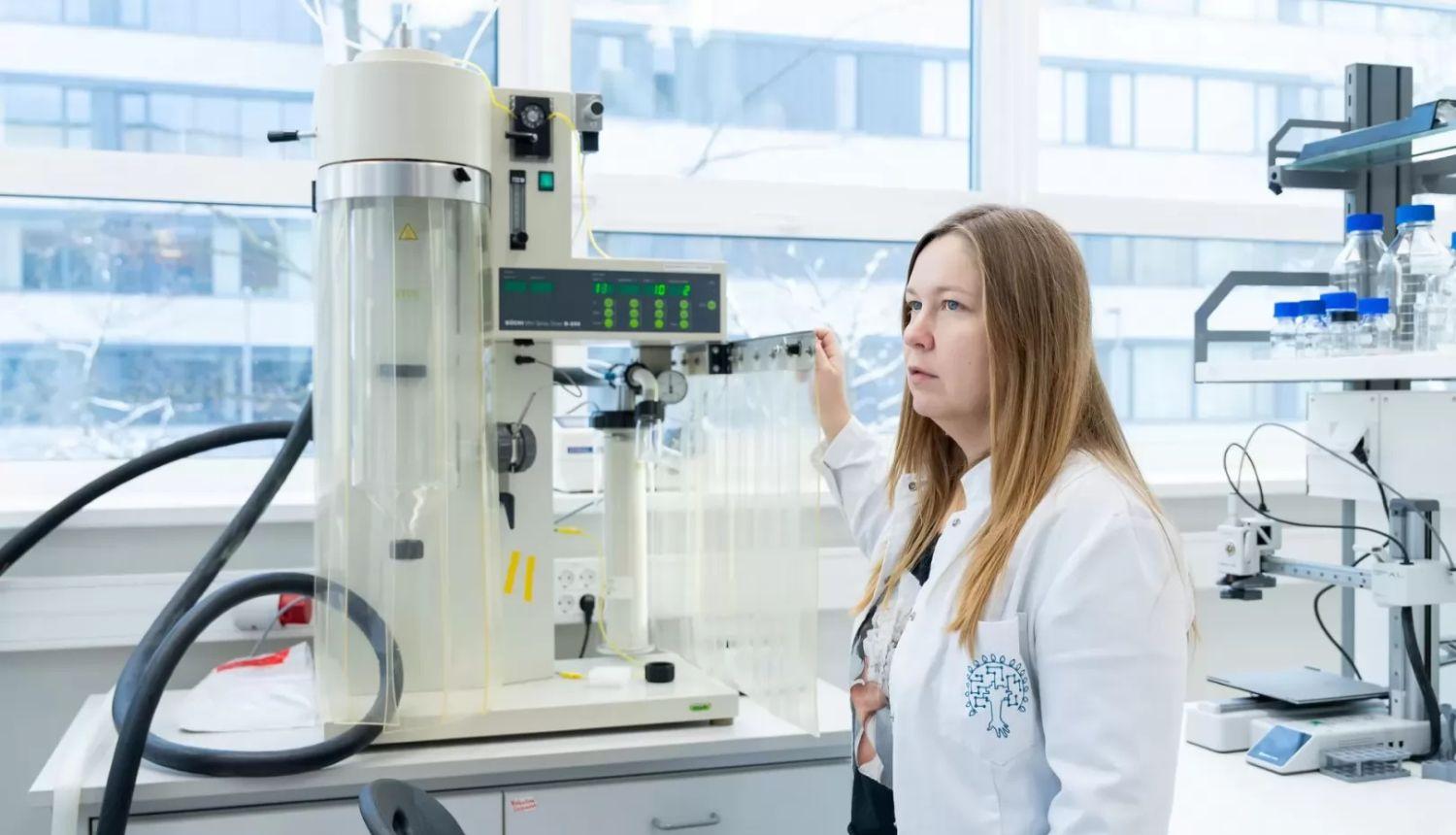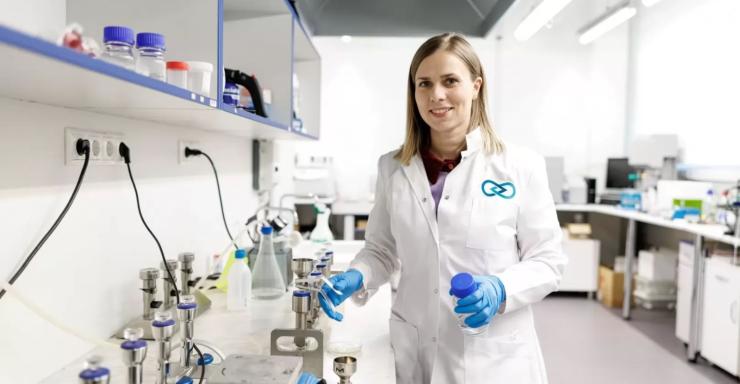Nine research teams from Riga Technical University (RTU) have received €1.8 million from the national research program “Biomedical and Photonics Research Platform for the Development of Innovative Products” (BioPhoT). Within one year, they will transform scientific results and technologies into practical solutions in biomedicine, photonics, sustainable chemistry, and innovative engineering, and move them closer to the market.

Funded RTU projects include:
- BIOCORE – Biomaterials for infection control and rapid bone regeneration
Team leader – Professor Dagnija Loča, RTU Faculty of Natural Sciences and Technology, Institute of Biomaterials and Bioengineering. Infections and slow bone healing are serious challenges in medicine, particularly after injuries or surgeries. Existing materials often fail to prevent infection while simultaneously stimulating bone regeneration. This project develops next-generation biomaterials with antibacterial properties that also promote bone healing, providing society with safer and more effective treatments for faster recovery.
- Durable protective coatings for electronic devices
Team leader – Tenured Professor Sergejs Gaidukovs, RTU Faculty of Natural Sciences and Technology. Electromagnetic interference can cause data loss and damage to equipment. Currently, there is a lack of effective, sustainable protective materials. The project develops a new coating that shields devices from electromagnetic interference, ensuring stable and secure operation. This will contribute to more reliable cybersecurity solutions.
- Next-generation blood collection tube
Team leader – Senior Researcher Arita Dubņika, RTU Faculty of Natural Sciences and Technology, Institute of Biomaterials and Bioengineering. Bone regeneration procedures require high-quality biomaterials, which are supplemented during surgery with blood components. Existing blood collection tools often limit the quality of results. The project develops a novel type of tube that enhances the preparation and application of biomaterials with blood components, facilitating safer and more precise procedures while reducing the risk of complications.
- RE-TECH-ROAD – Recycling waste tyres into asphalt
Team leader – Associate Professor Viktors Haritonovs, RTU Faculty of Civil Engineering and Mechanical Engineering, Institute of Civil Engineering. Tire recycling is often based on low-value solutions, and some practices even create additional environmental risks. This project introduces a new approach - reactive extrusion technology to create an intelligent multifunctional modifier. When added to road construction materials, it rejuvenates aged bitumen, enhances self-healing properties, and promotes the recycling of tyres and asphalt, resulting in more durable and sustainable roads.
- B-Shield – Sink disinfection device against resistant microorganisms
Team leader – Senior Researcher Brigita Dejus, RTU Faculty of Natural Sciences and Technology, Institute of Water Systems and Biotechnology. Antibiotic resistance is a global issue that leads to the spread of dangerous microorganisms, particularly in hospitals. Traditional disinfection methods often fail to provide sufficient protection. The project develops a device integrated into sinks that automatically eliminates microorganisms, reducing infection risks and improving public health.
- Optical fibre Bragg grating sensor reader
Team leader – Senior Researcher Andis Supe, RTU Faculty of Computer Science, Information Technology and Energy, Institute of Photonics, Electronics and Telecommunications. Engineering structures and equipment require precise monitoring of loads and deformations, but current solutions are often expensive and bulky. Researchers propose a compact and affordable optical converter that ensures high-precision measurements, resulting in safer buildings, more reliable equipment, and broader access to sensor technologies.
- VIWO-LAB – Virtual laboratory for timber structures
Team leader – Senior Researcher Jānis Šliseris, RTU Faculty of Civil Engineering and Mechanical Engineering, Institute of Civil Engineering. Real-life testing of timber structures is costly and time-consuming. Researchers are creating a digital testing environment to model and verify solutions before construction. This shortens the path to safer, more resource-efficient, and sustainable projects.
- SwyCard – Biomarker detection in sweat
Team leader – Senior Researcher Kristaps Kļaviņš, RTU Faculty of Natural Sciences and Technology, Institute of Biomaterials and Bioengineering. Traditional diagnostic tests, especially for newborns, are often invasive and may pose additional risks. Researchers are developing a non-invasive diagnostic platform that detects clinical biomarkers in sweat, allowing for real-time health monitoring and early detection of problems.
- CO₂ filter from recycled construction waste
Team leader – Senior Researcher Māris Šinka, RTU Faculty of Civil Engineering and Mechanical Engineering, Institute of Sustainable Building Materials and Systems. The project addresses two environmental challenges CO₂ emissions and construction waste. Researchers are developing a filter capable of capturing CO₂ using recycled construction materials. This reduces climate impact while giving waste materials new value.
Each project has been allocated €200,000, enabling teams to increase technology readiness levels by at least one stage. This is a direct investment in productivity, the creation of science-intensive start-ups, and the overall resilience and competitiveness of Latvia’s economy in the global arena. The funding is not only intended for laboratory research - it serves as a bridge to practical application, including pilot projects in industry, intellectual property protection, commercialisation strategies, and international cooperation.
"The next task is to help teams transition from laboratory settings to real-world validation, strengthen industry collaboration, and raise the technological readiness of innovations - from concepts to practical solutions. This means creating prototypes, testing solutions outside laboratories, preparing patent applications, complementing teams with business expertise, conducting market research, and fostering international partnerships," emphasises Andris Baumanis, Coordinator of the RTU BioPhoT mentoring network.
A total of 40 projects submitted by various universities and research organisations were approved in the first BioPhoT research and innovation competition. Applications were evaluated in two stages: first, by an international panel of independent industry and commercialisation experts, and then by scientific excellence assessments conducted by experts engaged by the Latvian Council of Science.
BioPhoT opens up unprecedented opportunities for scientists to advance innovations that address significant societal and industrial challenges, while contributing to a competitive economy. The approved RTU projects demonstrate the university’s contribution to innovation with real market potential and societal impact. These solutions not only strengthen Latvia’s innovation ecosystem but also highlight RTU’s role in the international research landscape, aligning with European priorities such as healthcare modernisation, digital transformation, and the European Green Deal. BioPhoT’s goal is clear: to transform Latvia’s scientific capital into productivity and export potential.
BioPhoT is implemented within the long-term national research program “Innovation Fund – Long-Term Research Program”, financed by the Ministry of Economics. Program code: IVPP-EM-Innovation-2024/1-0002.
BioPhoT is coordinated by the Latvian Institute of Organic Synthesis and implemented by RTU, the Institute of Electronics and Computer Science, the Latvian Biomedical Research and Study Centre, the University of Latvia, the Institute of Solid State Physics (UL), the Latvian State Institute of Wood Chemistry, the Institute of Food Safety, Animal Health and Environment "BIOR", and Riga Stradiņš University.


